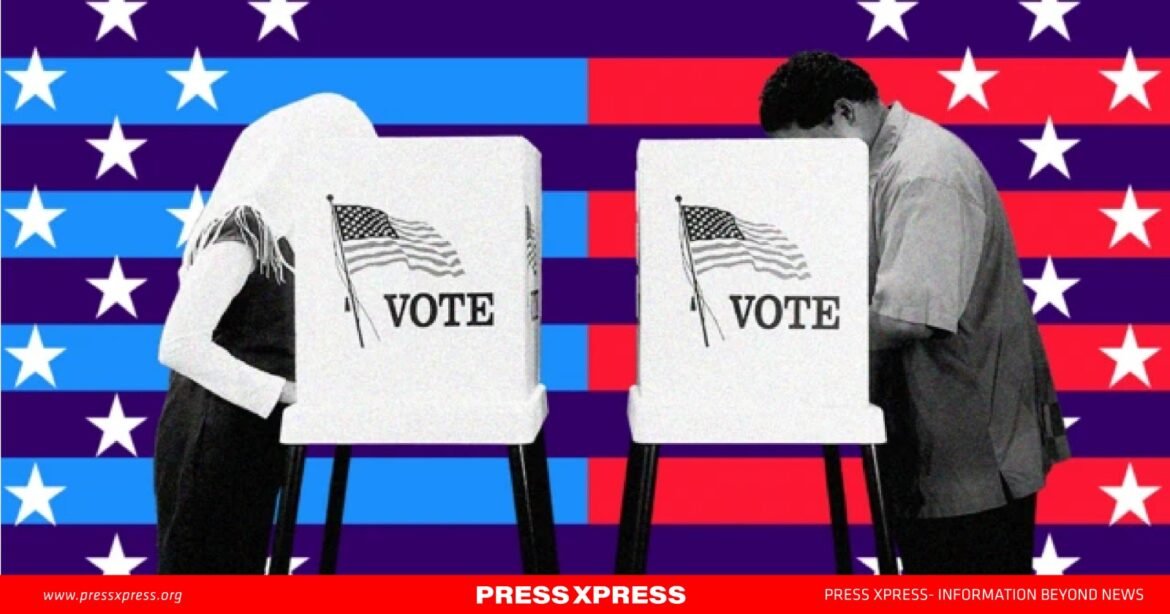Concerns surrounding the possibility of illegal immigrants voting in U.S. elections remain prevalent, as a new Scripps/Ipsos poll reveals that 51% of adults are apprehensive about non-citizens casting ballots in upcoming elections. This sentiment is especially pronounced among Republicans, with 83% expressing worry, compared to 46% of independents and 24% of Democrats. The poll, which surveyed 1,027 adults and carries a margin of error of 3.6%, underscores a political divide on the issue.
Former President Donald Trump, alongside Republican allies, has frequently alleged that Democrats are attempting to encourage illegal immigrants to vote, an accusation he reiterated during a recent debate with Kamala Harris. “Our elections are bad, and a lot of these illegal immigrants coming in, they’re trying to get them to vote,” Trump stated. However, these claims lack substantiated evidence, as voting by non-citizens is not only illegal but also a rare occurrence, according to multiple studies.
The poll also highlighted that 54% of respondents, including a majority of Republicans (86%), a substantial portion of independents (58%), and 25% of Democrats, support Trump’s proposal for mass deportations of undocumented migrants. Critics argue that this approach could overwhelm immigration courts, drain law enforcement resources, and incur significant costs.

An analysis by BBC Verify found that since September, over 100 paid ads on social media platforms such as Facebook and Instagram have focused on voter fraud involving illegal immigrants. These ads, primarily from Republican sources, reached millions of users and continue to perpetuate concerns regarding election integrity. Although instances of non-citizens voting are infrequent, Trump and other Republican figures are amplifying these fears, advocating for increased voter registration checks and audits.
Legal Barriers to Non-Citizen Voting
Federal law, specifically the Illegal Immigration Reform and Immigrant Responsibility Act of 1996, prohibits non-citizens from participating in federal elections. Offenders face penalties that may include imprisonment, fines, and deportation. States also employ mechanisms to prevent illegal voting; prospective voters must attest to their citizenship under penalty of perjury, although they are not required to provide documentary proof.
Experts argue that these measures effectively deter illegal immigrants from voting. “That first step of having to tick a box saying you’re a citizen to register to vote is a huge deterrent,” said Jasleen Singh of the Brennan Center for Justice. Additionally, states regularly cross-reference voter rolls with databases from immigration services and other records to ensure eligibility.
Nonetheless, some municipalities in states like California, Maryland, and Vermont, as well as Washington, D.C., allow non-citizens to vote in certain local elections, such as school board elections. Republicans argue these exceptions could pave the way for broader voter fraud, but research consistently shows these instances remain isolated and minor.
Studies Show Rare Incidents of Illegal Voting
Studies from organizations across the political spectrum, such as the Brennan Center and the conservative Heritage Foundation, have shown that instances of non-citizens voting are negligible. A Brennan Center study found just 30 cases of potential non-citizen voting across 23.5 million ballots in 12 states during the 2016 election—an occurrence rate of 0.0001%.
Despite this, Republicans continue to call for stricter measures. The proposed Safeguard American Voter Eligibility (SAVE) Act would require proof of citizenship during voter registration, although it failed to pass in the House of Representatives. Figures like House Republican leader Mike Johnson highlight isolated instances from states such as Ohio, Pennsylvania, and Georgia, where audits found minimal cases of non-citizen registration errors. While these cases were flagged for further investigation, the numbers remain too small to suggest any substantial impact on election outcomes.
The proliferation of Republican ads, particularly on social media, has contributed to the spread of misinformation about non-citizen voting. Since September, BBC Verify identified 118 ads claiming widespread illegal voting or questioning non-citizen participation in elections. One ad alone, viewed over 2.4 million times, posed the question: “Should illegal immigrants be allowed to vote?” Such ads, which sow doubt about election integrity, are part of a larger strategy to galvanize Republican voters.
Debunked Studies Continue to Influence Debate
Debates about non-citizen voting have also been fueled by a discredited 2014 study from Old Dominion University. The study, which used an online survey to estimate non-citizen voter rates, faced criticism from political scientists for its flawed methodology. Nonetheless, Trump and others have cited this study to support claims of widespread illegal voting, despite its estimates being widely debunked and later revised down by the lead researcher, Jesse Richman.
The issue remains contentious as political parties gear up for the next election. While data shows that illegal voting by non-citizens is statistically insignificant, Republican leaders continue to raise concerns about election integrity, influencing public perception and campaign agendas.


